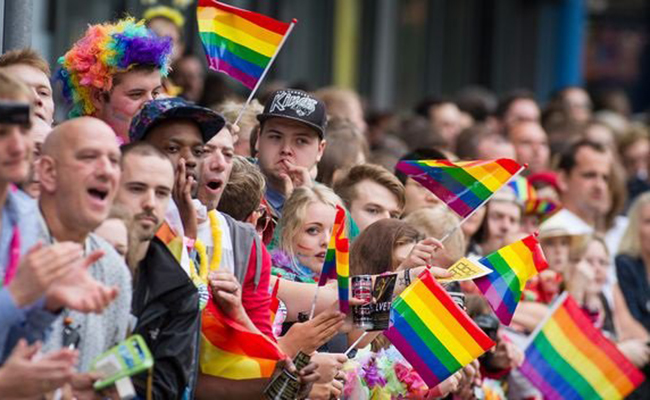‘The most important thing gay men can do during Mental Health Awareness Week is talk to each other’
On a scene that revolves around having a good time, many of us are suffering in silence, writes Hadley Stewart
By Will Stroude

Rates of anxiety, depression and self-harm are higher amongst gay and bisexual men, compared with men in general. Suicide is the biggest killer for men under the age of 45 in Britain, yet gay and bisexual men are even more likely than the general male population to have attempted to take their own lives.
This shouldn’t be news to many of us – we’ve known for quite some time that poor mental health within the LGBT+ community is high. In fact, many high profile gay and bisexual men have spoken about some of their experiences of living with a mental health condition, attempting to start the conversation among others.
So despite this, why is it that we’re so bad at talking about mental health?
We seem able to talk about our physical health, but the same can’t be said for mental health. Why is that? A worrying trend that seems to have emerged as a result of people speaking more openly about their struggles with mental health, is that such discussion is “attention seeking” or simply “too much information”.

Perhaps the deep-seated stigma of poor mental health, coupled with an uneasiness and sometimes mocking behaviour that surround the conversation, seems to be why we’re just not that comfortable talking with our gay and bisexual friends about mental health.
Mental health is a part of everyone, which means none of us are immune to experiencing episodes of poor mental health. Of course, not all gay and bisexual men are living with a mental health condition, but as rates within our community are higher when compared with men in general, you’re either likely to experience mental ill health or know a friend who is.
So why aren’t more of us speaking out about it? The idea that talking about our mental health is some form of weakness is something that we all need to get over. Society’s view of masculinity has dictated to us that men should act a certain way. As gay and bisexual men, many of us may have been on the receiving end of bullying at school or discrimination later on in life, because we didn’t fit into these societal norms.
Unfortunately, these ‘norms’ linger in every part of our life and mental health is no exception. If we want to help others to talk about their mental health, we need to throw the masculinity rule book onto the bonfire, and reinforce the idea amongst our friendship group that there really is no right or wrong way to ‘be a man’.

Perhaps the gay scene also has a part to play when it comes to talking about mental health. The opportunities to mask what’s happening on the inside are readily available here – drink, drugs and loud music. Alcohol and other drugs are ways for us to lose our inhibitions, and consequently alter the way we’re feeling. If the choice is between drinking or talking, I think we can all appreciate why one of these options seems more favourable.
The club environment isn’t exactly an ideal spot to chat about depression – how can you maintain a potentially serious conversation whilst Ariana Grande is blasting in the background?
Music aside, the gay scene is viewed as a place to have a good time, implying we should leave everything else at the door. But if that’s the main place where we meet our gay and bisexual friends, no wonder we feel unable to have these conversations. Establishing new LGBT-friendly spaces away from the traditional gay scene might be a way to overcome this.

It’s clear that opportunities to talk about our struggles with mental health are simply unavailable to many of us. And when we do talk about it, stigma and societal attitudes seem to influence the way we’re perceived by others.
This week is National Mental Health Awareness Week – a chance for us to have more conversations about mental health with our friends. For many of us, talking about mental health and mental health conditions is something that we’re uncomfortable doing. Talking about a storyline in a soap, or an article you’ve read on mental health might be a helpful way to start the conversation.
Silence is the biggest winner when it comes to mental ill health, but as a community we can change that.
Mental Health Awareness Week runs May 14-20. For confidential advice and support call the Samaritans on 116 123.
Follow Hadley Stewart on Twitter @wordsbyhadley
